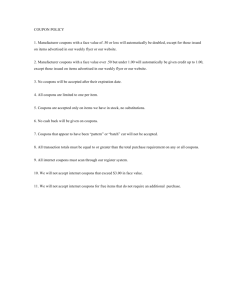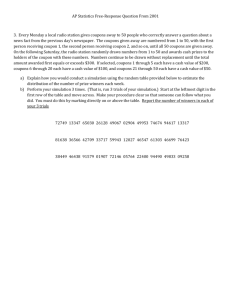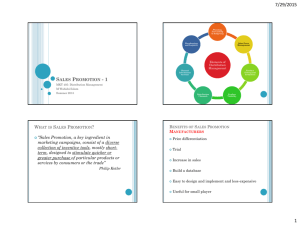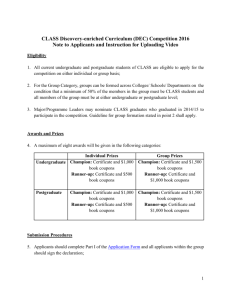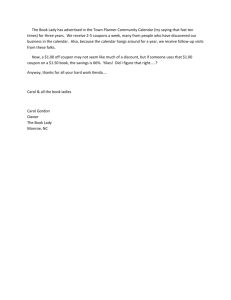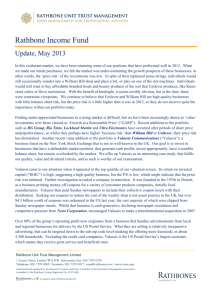NCH Marketing Services
advertisement
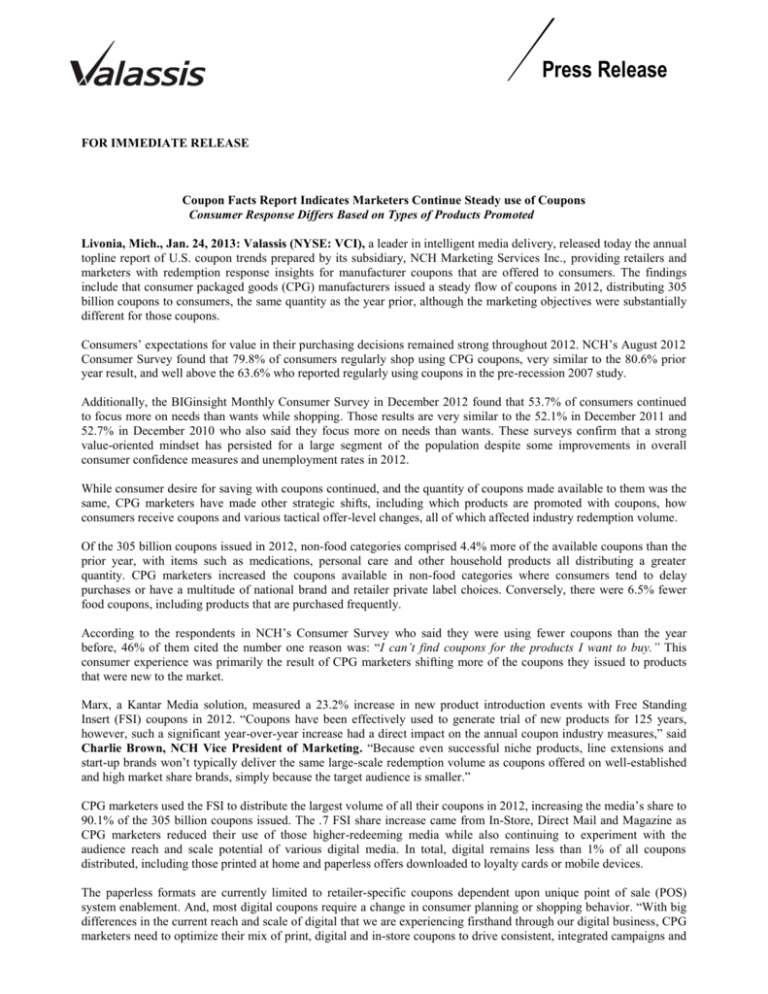
Press Release FOR IMMEDIATE RELEASE Coupon Facts Report Indicates Marketers Continue Steady use of Coupons Consumer Response Differs Based on Types of Products Promoted Livonia, Mich., Jan. 24, 2013: Valassis (NYSE: VCI), a leader in intelligent media delivery, released today the annual topline report of U.S. coupon trends prepared by its subsidiary, NCH Marketing Services Inc., providing retailers and marketers with redemption response insights for manufacturer coupons that are offered to consumers. The findings include that consumer packaged goods (CPG) manufacturers issued a steady flow of coupons in 2012, distributing 305 billion coupons to consumers, the same quantity as the year prior, although the marketing objectives were substantially different for those coupons. Consumers’ expectations for value in their purchasing decisions remained strong throughout 2012. NCH’s August 2012 Consumer Survey found that 79.8% of consumers regularly shop using CPG coupons, very similar to the 80.6% prior year result, and well above the 63.6% who reported regularly using coupons in the pre-recession 2007 study. Additionally, the BIGinsight Monthly Consumer Survey in December 2012 found that 53.7% of consumers continued to focus more on needs than wants while shopping. Those results are very similar to the 52.1% in December 2011 and 52.7% in December 2010 who also said they focus more on needs than wants. These surveys confirm that a strong value-oriented mindset has persisted for a large segment of the population despite some improvements in overall consumer confidence measures and unemployment rates in 2012. While consumer desire for saving with coupons continued, and the quantity of coupons made available to them was the same, CPG marketers have made other strategic shifts, including which products are promoted with coupons, how consumers receive coupons and various tactical offer-level changes, all of which affected industry redemption volume. Of the 305 billion coupons issued in 2012, non-food categories comprised 4.4% more of the available coupons than the prior year, with items such as medications, personal care and other household products all distributing a greater quantity. CPG marketers increased the coupons available in non-food categories where consumers tend to delay purchases or have a multitude of national brand and retailer private label choices. Conversely, there were 6.5% fewer food coupons, including products that are purchased frequently. According to the respondents in NCH’s Consumer Survey who said they were using fewer coupons than the year before, 46% of them cited the number one reason was: “I can’t find coupons for the products I want to buy.” This consumer experience was primarily the result of CPG marketers shifting more of the coupons they issued to products that were new to the market. Marx, a Kantar Media solution, measured a 23.2% increase in new product introduction events with Free Standing Insert (FSI) coupons in 2012. “Coupons have been effectively used to generate trial of new products for 125 years, however, such a significant year-over-year increase had a direct impact on the annual coupon industry measures,” said Charlie Brown, NCH Vice President of Marketing. “Because even successful niche products, line extensions and start-up brands won’t typically deliver the same large-scale redemption volume as coupons offered on well-established and high market share brands, simply because the target audience is smaller.” CPG marketers used the FSI to distribute the largest volume of all their coupons in 2012, increasing the media’s share to 90.1% of the 305 billion coupons issued. The .7 FSI share increase came from In-Store, Direct Mail and Magazine as CPG marketers reduced their use of those higher-redeeming media while also continuing to experiment with the audience reach and scale potential of various digital media. In total, digital remains less than 1% of all coupons distributed, including those printed at home and paperless offers downloaded to loyalty cards or mobile devices. The paperless formats are currently limited to retailer-specific coupons dependent upon unique point of sale (POS) system enablement. And, most digital coupons require a change in consumer planning or shopping behavior. “With big differences in the current reach and scale of digital that we are experiencing firsthand through our digital business, CPG marketers need to optimize their mix of print, digital and in-store coupons to drive consistent, integrated campaigns and reach all their relevant consumer audiences,” said Suzie Brown, Valassis Executive Vice President of Sales and Marketing. All of the year-over-year strategy-shifts created an inconsistent annual result for total CPG coupon redemption volume, down 17% to 2.9 billion coupons for 2012. While this reduced volume saved marketers a substantial $800 million in face value discounts, it also raised the cost of per unit items that benefit from higher volume efficiencies, such as retailer redemption handling, auditing and settlement services. “When making year-over-year comparisons, it’s important to keep in mind the conditions and marketer activities of the prior year as well, such as in the case of redemption volume, where the 2012 result would be measured against a year when redemption was growing at an unusual pace for the CPG industry,” added Charlie Brown. A number of other strategic choices and seemingly minor tactical tweaks occurred in 2012, all contributing to the yearover-year change in CPG redemption volume, including: Average face values distributed declined -1.3% to $1.53 overall, and dropped to $0.99 for food coupons. Coupons requiring the purchase of two or more products increased to 29% of all coupons distributed, up two share points, and reached 45% of all food coupons. Expiration dates shortened 6.1% to 9.3 weeks on average, and dropped to an average of only 8 weeks for nonfood coupons. For more information on NCH’s 2013 Coupon Facts report, visit www.nchresourcecenter.com. About Valassis Valassis (NYSE: VCI) is a leader in intelligent media delivery, providing over 15,000 advertisers proven and innovative media solutions to influence consumers wherever they plan, shop, buy and share. By integrating online and offline data combined with powerful insights, Valassis precisely targets its clients’ most valuable shoppers, offering unparalleled reach and scale. Valassis subsidiaries include Brand.net, a Valassis Digital Company, and NCH Marketing Services Inc. Valassis consumer brands include RedPlum® and save.com. Its signature Have You Seen Me?® program delivers hope to missing children and their families. To learn more, visit Valassis.com. Cautionary Statements Regarding Forward-looking Statements This document contains “forward-looking statements” within the meaning of the Private Securities Litigation Reform Act of 1995. Such forward-looking statements involve known and unknown risks and uncertainties and other factors which may cause our actual results, performance or achievements to be materially different from any future results, performance or achievements expressed or implied by such forward-looking statements. Such factors include, among others, the following: price competition from our existing competitors; new competitors in any of our businesses; a shift in client preferences for different promotional materials, strategies or coupon delivery methods, including, without limitation, as a result of declines in newspaper circulation and/or increased competition from new media formats including digital; an unforeseen increase in paper or postal costs; changes which affect the businesses of our clients and lead to reduced sales promotion spending, including, without limitation, a decrease of marketing budgets which are generally discretionary in nature and easier to reduce in the short-term than other expenses; our substantial indebtedness, and ability to refinance such indebtedness, if necessary, and our ability to incur additional indebtedness, may affect our financial health; the financial condition, including bankruptcies, of our clients, suppliers, senior secured credit facility lenders or other counterparties; certain covenants in our debt documents could adversely restrict our financial and operating flexibility; fluctuations in the amount, timing, pages, weight and kinds of advertising pieces from period to period, due to a change in our clients’ promotional needs, inventories and other factors, including, without limitation, high levels of coupon redemption rates; our failure to attract and retain qualified personnel may affect our business and results of operations; a rise in interest rates could increase our borrowing costs; possible governmental regulation or litigation affecting aspects of our business; clients experiencing financial difficulties, or otherwise being unable to meet their obligations as they become due, could affect our results of operations and financial condition; uncertainty in the application and interpretation of applicable state sales tax laws may expose us to additional sales tax liability; and general economic conditions, whether nationally, internationally, or in the market areas in which we conduct our business, including the adverse impact of the ongoing economic downturn on the marketing expenditures and activities of our clients and prospective clients as well as our vendors, with whom we rely on to provide us with quality materials at the right prices and in a timely manner. These and other risks and uncertainties related to our business are described in greater detail in our filings with the United States Securities and Exchange Commission, including our reports on Forms 10-K and 10-Q and the foregoing information should be read in conjunction with these filings. We disclaim any intention or obligation to update or revise any forward-looking statements, whether as a result of new information, future events or otherwise. Contact: Mary Broaddus Director, Investor Relations and Corporate Communications 734-591-7375 broaddusm@valassis.com

